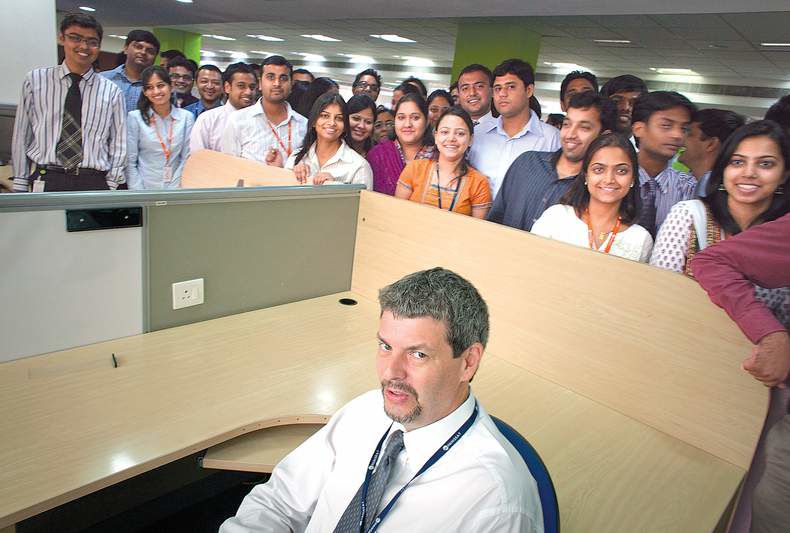Due diligence from overseas
Published 5:00 am Thursday, August 5, 2010

- Chirstopher Wheeler, assistant vice president of litigation and risk management at Pangea3, a legal outsourcing firm, has a team of 110 Indian lawyers in Noida, India. They do the legal grunt work that traditionally would be assigned to young lawyers in the U.S.
NOIDA, India — As an assistant attorney general for New York state, Christopher Wheeler used to spend most of his time arguing in courtrooms in New York City.
Today, he works in a sprawling, unfinished planned suburb of New Delhi, where office buildings are sprouting from empty lots and dirt roads are fringed with fresh juice stalls and construction rubble. At Pangea3, a legal outsourcing firm, Wheeler manages a team of 110 Indian lawyers who do the grunt work traditionally assigned to young lawyers in the United States — at a fraction of the cost.
India’s legal outsourcing industry has grown in recent years from an experimental endeavor to a small but mainstream part of the global business of law. Cash-conscious Wall Street banks, mining giants, insurance firms and industrial conglomerates are hiring lawyers in India for document review, due diligence, contract management and more.
Now, to win new clients and take on more sophisticated work, legal outsourcing firms in India are actively recruiting experienced lawyers from the West. And American and British lawyers — who might once have turned up their noses at the idea of moving to India, or harbored an outright hostility to outsourcing legal work in principle — are re-evaluating the sector.
The number of legal outsourcing companies in India has mushroomed to more than 140 at the end of 2009, from 40 in 2005, according to Valuenotes, a consulting firm in Pune, India. Revenue at India’s legal outsourcing firms is expected to grow to $440 million this year, up 38 percent from 2008, and should surpass $1 billion by 2014, Valuenotes estimates.
Many legal outsourcing firms have offices around the world to interact with clients, but keep the majority of their employees in India; some also have a stable of lawyers in the Philippines. Thanks to India’s low wages and costs and a big pool of young, English-speaking lawyers, outsourcing firms charge from one-tenth to one-third what a Western law firm bills an hour.
Employees at legal outsourcing companies in India are not allowed by Indian law to give legal advice to clients in the West, no matter their qualifications. Instead, legal outsourcing companies perform a lot of the functions that a junior lawyer might do in a American law firm.
Western lawyers making the leap to legal outsourcing companies come for a variety of reasons, but nearly universally, they say they stay for the opportunities to build a business and manage people.
“In many respects it is more rewarding than jobs I had in the United States,” said Wheeler, who moved to India when his Indian-born wife took a job here in 2006.
“If you’re talking about 15 employees in a windowless basement office, I’m not interested in making that my life’s calling,” he recalled thinking when he started talking to Pangea3. “But building a 500-person office, now that is a real challenge.”
Shelly Dalrymple left her job as a partner at a firm in Tulsa, Okla., in 2007 and is now based in India as the senior vice president of global litigation services at UnitedLex, a legal outsourcing company with offices in the United States, Britain, Israel and India.
When she first joined the industry, she said, growth was being driven by corporations that were pushing law firms to outsource to save money. Now, Western law firms themselves are starting to embrace the industry, she said. “We are seeing law firms who are putting a lot of thought into their future coming to us with interesting and creative ideas,” she said.
Partners in the West are asking legal outsourcing companies in India to create dedicated teams of lawyers for their firms, for example. Those teams could expand and contract depending on how much business the Western firm has. “That means a law firm with 500 members in Chicago can compete with a 2,000-member firm in New York,” Dalrymple said.
Moving to a legal outsourcing firm, especially in India, is not for everyone. About 5 percent of Western transplants cannot handle it and move back home, managers estimate.
Even lawyers who stay are sometimes wistful about their previous careers. “Of course I miss litigation,” Wheeler said. But, he added, “watching people learn some of the same skills I did is gratifying.”






